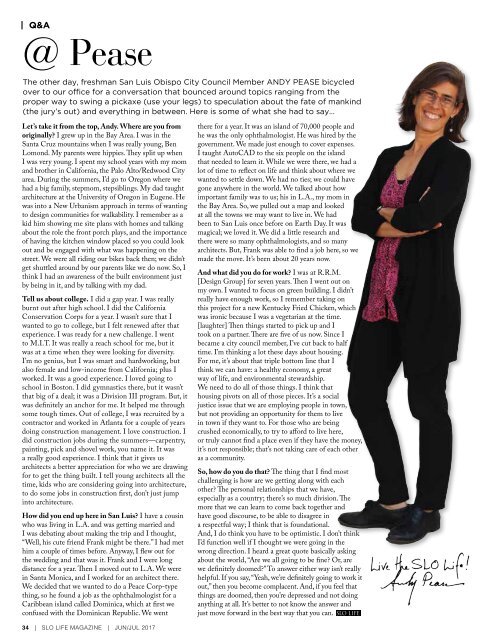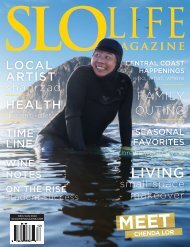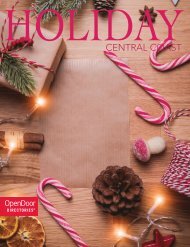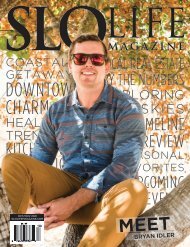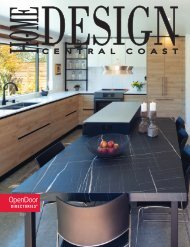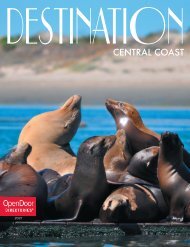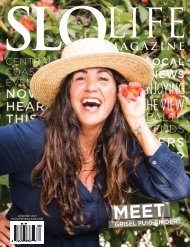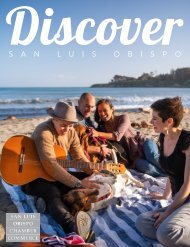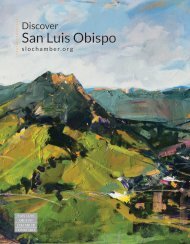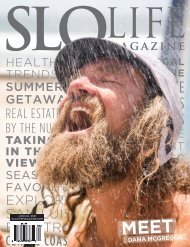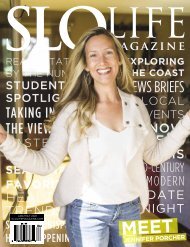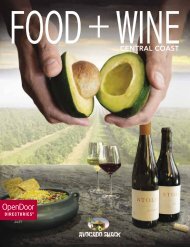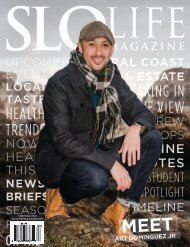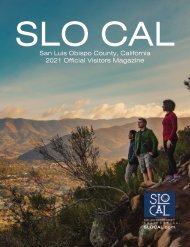SLO LIFE Jun/Jul 2017
You also want an ePaper? Increase the reach of your titles
YUMPU automatically turns print PDFs into web optimized ePapers that Google loves.
| Q&A<br />
@ Pease<br />
The other day, freshman San Luis Obispo City Council Member ANDY PEASE bicycled<br />
over to our office for a conversation that bounced around topics ranging from the<br />
proper way to swing a pickaxe (use your legs) to speculation about the fate of mankind<br />
(the jury’s out) and everything in between. Here is some of what she had to say…<br />
Let’s take it from the top, Andy. Where are you from<br />
originally? I grew up in the Bay Area. I was in the<br />
Santa Cruz mountains when I was really young, Ben<br />
Lomond. My parents were hippies. They split up when<br />
I was very young. I spent my school years with my mom<br />
and brother in California, the Palo Alto/Redwood City<br />
area. During the summers, I’d go to Oregon where we<br />
had a big family, stepmom, stepsiblings. My dad taught<br />
architecture at the University of Oregon in Eugene. He<br />
was into a New Urbanism approach in terms of wanting<br />
to design communities for walkability. I remember as a<br />
kid him showing me site plans with homes and talking<br />
about the role the front porch plays, and the importance<br />
of having the kitchen window placed so you could look<br />
out and be engaged with what was happening on the<br />
street. We were all riding our bikes back then; we didn’t<br />
get shuttled around by our parents like we do now. So, I<br />
think I had an awareness of the built environment just<br />
by being in it, and by talking with my dad.<br />
Tell us about college. I did a gap year. I was really<br />
burnt out after high school. I did the California<br />
Conservation Corps for a year. I wasn’t sure that I<br />
wanted to go to college, but I felt renewed after that<br />
experience. I was ready for a new challenge. I went<br />
to M.I.T. It was really a reach school for me, but it<br />
was at a time when they were looking for diversity.<br />
I’m no genius, but I was smart and hardworking, but<br />
also female and low-income from California; plus I<br />
worked. It was a good experience. I loved going to<br />
school in Boston. I did gymnastics there, but it wasn’t<br />
that big of a deal; it was a Division III program. But, it<br />
was definitely an anchor for me. It helped me through<br />
some tough times. Out of college, I was recruited by a<br />
contractor and worked in Atlanta for a couple of years<br />
doing construction management. I love construction. I<br />
did construction jobs during the summers—carpentry,<br />
painting, pick and shovel work, you name it. It was<br />
a really good experience. I think that it gives us<br />
architects a better appreciation for who we are drawing<br />
for to get the thing built. I tell young architects all the<br />
time, kids who are considering going into architecture,<br />
to do some jobs in construction first, don’t just jump<br />
into architecture.<br />
How did you end up here in San Luis? I have a cousin<br />
who was living in L.A. and was getting married and<br />
I was debating about making the trip and I thought,<br />
“Well, his cute friend Frank might be there.” I had met<br />
him a couple of times before. Anyway, I flew out for<br />
the wedding and that was it. Frank and I were long<br />
distance for a year. Then I moved out to L.A. We were<br />
in Santa Monica, and I worked for an architect there.<br />
We decided that we wanted to do a Peace Corp-type<br />
thing, so he found a job as the ophthalmologist for a<br />
Caribbean island called Dominica, which at first we<br />
confused with the Dominican Republic. We went<br />
there for a year. It was an island of 70,000 people and<br />
he was the only ophthalmologist. He was hired by the<br />
government. We made just enough to cover expenses.<br />
I taught AutoCAD to the six people on the island<br />
that needed to learn it. While we were there, we had a<br />
lot of time to reflect on life and think about where we<br />
wanted to settle down. We had no ties; we could have<br />
gone anywhere in the world. We talked about how<br />
important family was to us; his in L.A., my mom in<br />
the Bay Area. So, we pulled out a map and looked<br />
at all the towns we may want to live in. We had<br />
been to San Luis once before on Earth Day. It was<br />
magical; we loved it. We did a little research and<br />
there were so many ophthalmologists, and so many<br />
architects. But, Frank was able to find a job here, so we<br />
made the move. It’s been about 20 years now.<br />
And what did you do for work? I was at R.R.M.<br />
[Design Group] for seven years. Then I went out on<br />
my own. I wanted to focus on green building. I didn’t<br />
really have enough work, so I remember taking on<br />
this project for a new Kentucky Fried Chicken, which<br />
was ironic because I was a vegetarian at the time.<br />
[laughter] Then things started to pick up and I<br />
took on a partner. There are five of us now. Since I<br />
became a city council member, I’ve cut back to half<br />
time. I’m thinking a lot these days about housing.<br />
For me, it’s about that triple bottom line that I<br />
think we can have: a healthy economy, a great<br />
way of life, and environmental stewardship.<br />
We need to do all of those things. I think that<br />
housing pivots on all of those pieces. It’s a social<br />
justice issue that we are employing people in town,<br />
but not providing an opportunity for them to live<br />
in town if they want to. For those who are being<br />
crushed economically, to try to afford to live here,<br />
or truly cannot find a place even if they have the money,<br />
it’s not responsible; that’s not taking care of each other<br />
as a community.<br />
So, how do you do that? The thing that I find most<br />
challenging is how are we getting along with each<br />
other? The personal relationships that we have,<br />
especially as a country; there’s so much division. The<br />
more that we can learn to come back together and<br />
have good discourse, to be able to disagree in<br />
a respectful way; I think that is foundational.<br />
And, I do think you have to be optimistic. I don’t think<br />
I’d function well if I thought we were going in the<br />
wrong direction. I heard a great quote basically asking<br />
about the world, “Are we all going to be fine? Or, are<br />
we definitely doomed?” To answer either way isn’t really<br />
helpful. If you say, “Yeah, we’re definitely going to work it<br />
out,” then you become complacent. And, if you feel that<br />
things are doomed, then you’re depressed and not doing<br />
anything at all. It’s better to not know the answer and<br />
just move forward in the best way that you can. <strong>SLO</strong> <strong>LIFE</strong><br />
34 | <strong>SLO</strong> <strong>LIFE</strong> MAGAZINE | JUN/JUL <strong>2017</strong>


